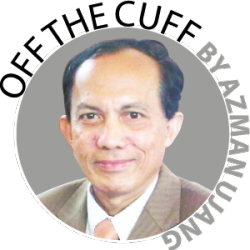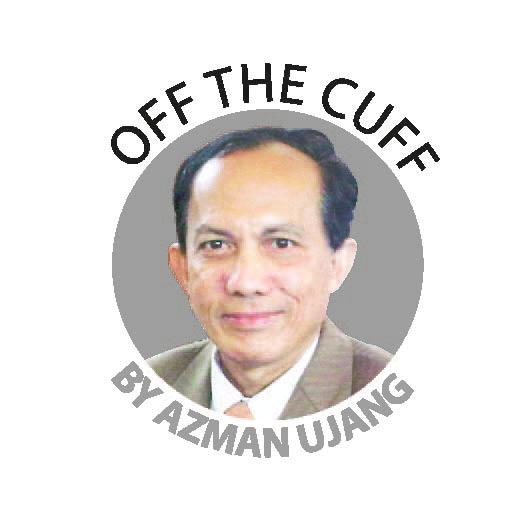TRANSPARENCY International has released its latest Corruption Perception Index (CPI) that basically is a report card on corruption in 180 countries.
For over 23 years, the Berlin-based ombudsman for corruption has used the term “perception”.
And because its findings and ranking of each country are shrouded under “perception”, many countries and their leaders tend not to take the CPI as seriously as they should. They can say that it’s just perception.
I propose that TI rebrand CPI as Corruption Reality Index (CRI).
TI can reset its methodology on CPI because corruption is no longer perception but reality. And harsh reality at that.
I posed this question to TI-Malaysia president Datuk Seri Akhbar Satar, who said: “I certainly agree that the time has come to drop the word ‘perception’ in favour of ‘reality’.
“Good point that you have raised. In Malaysia the reality is worse than perception. Corruption not only involves on and under the table but together with the table as well,” he said.
The release of the TI report coincided with a historical development in Malaysia’s over four-decade-old institutionalised fight against corruption – the launch on Tuesday by Prime Minister Tun Dr Mahathir Mohamad of the National Anti-Corruption Plan (NACP).
It’s a five-year plan that focuses on 22 strategies and 115 initiatives.
It’s the most comprehensive such plan any country could ever come up with. For Malaysia, it’s timely and pertinent given the fact that our country has for the past year been making world headlines on the corruption front.
As someone who sat for six years until a year ago on two advisory panels of the Malaysian Anti-Corruption Commission (MACC), I’m delighted with one of the strategies in the plan that introduced a prime minister’s directive governing demarcation of power between ministers and secretaries-general of the ministries.
This must have come as a huge relief to the secretaries-general which if complied with by Cabinet members, would mean the former can sleep better without having to worry about directives from their political masters that they used to carry out against their will or against the rule of law.
It’s an open secret that in the previous government, a number of secretaries-general were transferred or placed in “cold storage” for being unable to work in sync with certain ministers.
I was invited over two years ago by the then chief secretary to the government, Tan Sri Dr Ali Hamsa to speak to secretaries-general and directors-general on media matters and I took the opportunity to pose this demarcation of power.
It’s natural to expect these very senior civil servants to “play safe” for fear of losing their position.
Abuse of power is a recipe for corrupt practice when power is monetised.
For example, a country like Malaysia, which is seeing over-development especially in the property sector that has led to developers reporting a glut in housing and shopping malls, the rush to get such projects started could be a fertile breeding ground for corruption.
Bureaucratic or administrative delays in getting the approvals for such projects cost money and could push the prices of projects up and developers are at the mercy of the approving authorities.
In Malaysia, wrongdoing involving government procurements at 42.8% topped the list of sectors prone to corruption based on complaints to the MACC between 2013 and last year.
This is followed by enforcement at 23.9%, administration (13.4%), and licensing and permits at 8.6% while 63.3% of complaints involved the public sector, making it the sector most vulnerable to corruption. This is to be expected because it’s the public sector that has the power that is exchangeable with money.
The role of the Ministry of Finance as the key custodian of the nation’s cash in ensuring water-tight checks before any payment is released has become even more critical for the NACP to achieve its goals.
How else could we hope to prevent leakages of funds reported annually by the auditor-general if such weaknesses are not fixed or plugged?
Former auditor-general Tan Sri Ambrin Buang told me that awarding government contracts or tenders via direct negotiation should be stopped.
“With direct negotiation, the procurements and projects are much, much more costly than through open tender and this is a huge loss to the country,” said Ambrin.
Mahathir said fighting corruption is the responsibility of everyone, from himself to those who should be teaching children to keep graft at bay.
The NACP has measures to quickly detect those involved in corruption and ensure that they pay for their crime.
Prevention is far more crucial than enforcement because if prevention fails, money would already be lost.
“Those who have to face the plan are members of the current administration and those who will serve in the future,” said the prime minister.
The NACP aims to make Malaysia corruption-free by 2023 and to shrug off its kleptocracy tag and be known for integrity. It’s a very tall order given the daily revelations of corrupt practice and accused persons including high-profile personalities being charged in court.
But with a new “war” being declared on corruption, all is not lost.
Comments : letters@thesundaily.com















